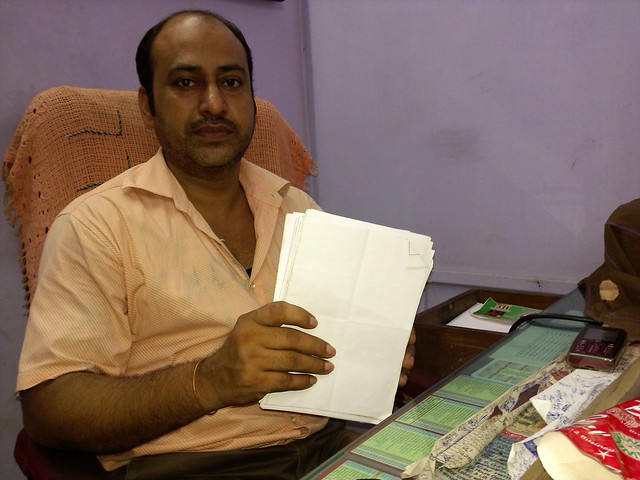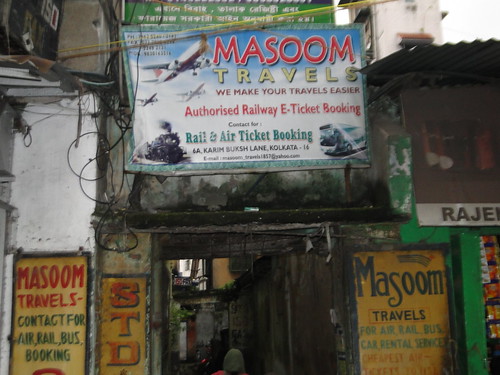This is the third in four parts series on “Terror tale: The strange case of Akhlaque Ahmed Khan,” which is one of the many such intriguing cases where Muslim youths were arrested on mere charges and are damned to spend their youthful years behind bars as undertrials.
Read Part I here: Over 14 years as undertrial on charges of conspiracy to wage war
Read Part II here: Similar charges slapped in Delhi and Kolkata
By M Reyaz, TwoCircles.net,
New Delhi/Kolkata: Syed Abu Nasir is a Bangladeshi citizen, who was allegedly arrested on January 7, 1999 at the New Delhi’s Paharganj station with 2 Kg RDX and five detonators by the Crime Branch of the Delhi Police. On the same night, Kolkata Police arrested Akhlaq Ahmed Khan, the owner of “Masoom Travels” from Kolkata.

Azad Ahmed Khan, brother of Akhlaque
Defence version: Abu Nasir’s counsel had argued in the Delhi court that he was first arrested in Kolkata by the Kolkata Police and had produced cuttings of few news papers in support and added that he was then taken to the Hyderabad and kept there for few days and finally brought to Delhi by the Delhi Police, where he was shown to be arrested on January 7, 1999 at the the New Delhi railway station.
The honourable court was not ready to accept the paper cuttings as evidence and hence relied on the prosecution version, although all the witnesses at the time of arrest comprised of the police and not a single independent person was made witness. Interestingly, the Kolkata case clearly mentions the arrest of Abu Nasir in Hyderabad, who used to visit the office of “Masoom Travels.”
Azad Ahmed Khan, youngest brother of Akhlaque, narrates a similar story giving more details. He says that that Abu Nasir had come for booking of tickets and left his Passports in the “Masoom Travels”. He says that in drunk condition he had some brawl after which he was taken into custody, although apparently no case was registered against him. After interrogating him, Police arrested his brother and later, one of his staffs Mritunjoy Das. He too says that Nasir was taken to the Hyderabad, and later to Delhi.
Azad further adds that the Police raided the premise of “Masoom Travels” only once on January 8, 1999 (the date of seizure shown in the first Alipore case, from which Akhlaque was subsequently discharged) and certainly not on January 27 of the same year (the date shown in the seizure of the ongoing Taltala case).
Azad alleges that based on one raid, two separate seizure lists, pertaining to two different FIRs in two Police stations, and moreover in two different dates were filed.

The dilapidated entrance of Masoom Travels.
Azad, who himself runs a travel agency cum Photostat/Fax/printout shop in his name, sitting in his office takes out a bundle of papers from a drawer and says, “These are xerox copies of Passports, voter I-cards and other documents, besides train and air tickets.” He explains that any travel agency generally keep a copy of documents of customers as well copies of tickets for record and future use. He wonders, “If Police raids my office today, of course they will find several photo-copies and few original documents. But does that make me a terrorist?” He argues that same was the case with his brother.
Loose ends: According to Police, Akhlaque was arrested in a case on the night of January 7, 1999 by the Bhawanipur Police (case was tried in Alipore court) from his home and the next day his office, “Masoom Travel” was raided and several documents were seized. This same fact is mentioned in the Delhi case as well and the prosecution relies on witnesses (both police and independent) from this case.
In the present case a different set of witnesses have been made and although Abu Nasir is a co-accused other two persons are different. There was no mention of these accomplice in the Delhi case, or vice versa.
Surprisingly, idol of Hindu goddess and two Passports of Abu Nasir are shown to be recovered from the office premise of Akhlaque in both the cases, although the date of seizures are different – January 7, 1999 in the first case and January 27, 1999 in the present case by two different raiding parties, and with two different set of purported witnesses. Now, how can same Passports be confiscated at two different dates from the same place?
After the acquittal from the Delhi court as the family of Akhlaque frantically appealed to Chief Metropolitan Magistrate (CMM), Session Court and the Calcutta High Court for bail, although repeatedly rejected, two purported letters, written in Urdu, surfaced in 2008 that the prosecution claimed to have found from the same premise during raid, although it finds no mention in the 20 page long seizure list. Moreover, the letters do not find any mention in the chargesheet either.

File photo of Akhlaque Ahmed Khan (Courtesy: ToI).
The first letter is purportedly written by Abdullah Salafi to Akhlaque that seeks help in facilitating the travel arrangements for an alleged ISI henchman. What is interesting in this letter is that it is written on the letterhead of “Masoom Travels,” rather unusual, for one generally writes a letter on own letterhead and not on that of whom it is addressed to.
The content of another letter, written on blank paper, appears strange, that according to Azad Ahmed Khan, brother of Akhlaque, from first reading itself appears fabricated. The second letter allegedly written by Abu Nasir urges Akhlaque to finish the work that Abdullah Salafi requested him to do, and not worry about the money as $5000 would soon be transferred. The letter further reads that its the duty of every Muslim to support the Jihad in Kashmir, to remove the BJP-led government at the centre at any cost, and for which they all need to work in unison. The counsel of Akhlaque had challenged the surfacing of letter at that point in the High Court, but the HC refused to intervene saying that the trial is pending and considering the seriousness of the content, it would be more appropriate to pass is through the scrutiny of the trial.
Read how Akhlaque’s bail petition was tossed from one court to another and his fate in final part of this series

